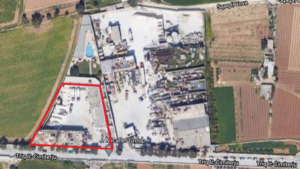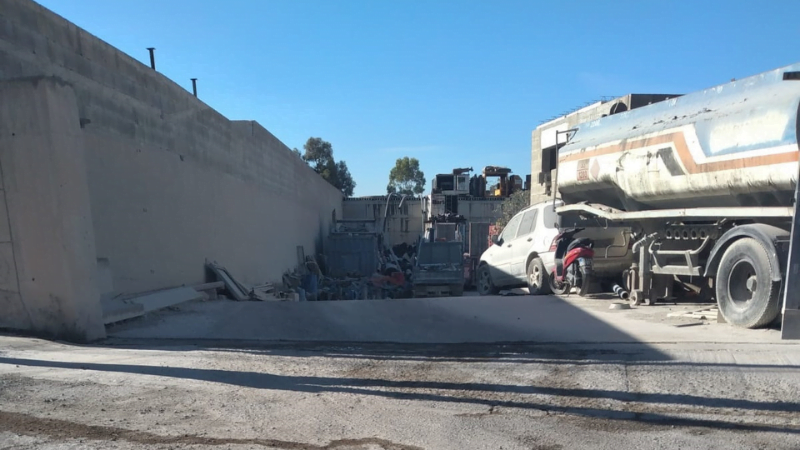Updated to include answers from the Planning Authority.
An investigation into illegal concrete batching plants in Malta has confirmed that at least three of them, located within an ODZ stretch of land in Ħal Għaxaq, have been operating with impunity for over three decades, with authorities from various administrations failing to adequately enforce laws meant to prevent such endeavours.
The developments are owned by three major construction companies that operate in Malta. Two of the developments are adjacent to each other in Triq iċ-Ċimiterju, with the other one adjacent to tal-Barrani road.
PA applications and enforcement notices revealed that the parcels of land, once considered agricultural, belong to Rockcut Group, J Micallef Builders Ltd and Schembri Barbros.
All three developments, now sprawling industrial complexes, began as minor developments that were conducted illegally and then later sanctioned or otherwise breached initial permit conditions repeatedly.
The PA told The Shift the developments were integrated into “areas of containment”, aimed at limiting further developments on the sites in question.
An analysis of the applications in chronological order highlights the progression from sanctioning minor works such as top-soil leveling and the raising of boundary walls, to changes in use which were later approved.
One of the developments, owned by J Micallef Builders, even includes a swimming pool and bar area overlooking the remaining fields.
Triq iċ-Ċimiterju becomes ‘Triq il-Konkrit’

An aerial shot of the yards owned by J Micallef Builders and Rockcut.
J Micallef Builders’ massive complex, which besides the pool and bar area includes a batching plant, heavy machinery and several rooms and buildings for storage and operations, has enforcement orders that stretch all the way back to 1998.
In that year, the company had removed top soil and changed the use of agricultural land to a parking space for vehicles.
Two separate enforcement notices (EC/00242/98 and EC/01013/98) indicate that the illegal developments were sanctioned.
With the land converted to non-agricultural use, J Micallef Builders took the development further in 2006 when the planning board approved the construction of an extension of two garages on-site meant to store plant machinery and workers’ vehicles (PA/06516/06).
Eleven years later, the PA was in for a rude awakening. An enforcement notice filed by the PA in 2017 highlights how the development mushroomed from a couple of garages into a massive operation (EC/00221/17) that “is not covered by any permits related to the site”.
The most recent sanctioning application was filed by J Micallef Builders Ltd earlier this year. The company aims to sanction the batching plant as well as the operation itself, meaning that the enforcement notice has been suspended.
The sanctioning application, PA/2673/21, is now awaiting the PA’s final decision. The Authority said, “a category C daily fine is currently imposed with regards to ECF221/17, which fine has reached the maximum capping of €50,000”.
The Authority did not specify whether the fine has actually been paid, saying only, “further enforcement action on EC221/17 is suspended awaiting final determination of PA/2673/21”.
Meanwhile, in an adjacent site, Rockcut’s illegal activity has been ongoing since at least 1997, with an enforcement notice from that year indicating that the company had illegally built stores, garages, offices and a boundary wall (EC/01350/97).

Entryway leading in to J Micallef Builders’ front yard.
Again, in spite of the obvious infraction of planning laws, the site had been given the authorities’ blessing to operate.
In 2009 and 2010, Rockcut had then applied to sanction the boundary walls, garages for industrial use and “proposed hoppers and enclosed silo at basement level for the loading and recycling of crushed limestone”.
According to the PA’s own site, the applications (PA/04147/09 and PA/00958/10) were both “passed on to a case officer for development proposal assessment in terms of SPED and other policies”.
However, the unnamed case officer and the assessments they were supposed to work on have mysteriously disappeared, with no answers being given by the PA when questions were sent about the verdict of the case officer’s deliberations.
Even more questionable is the enforcement notice issued to the site in 2010. The notice, EC/00189/10, confirmed that the applicant had completely flouted planning laws by installing a batching plant and building more garages and store rooms without a permit.
Instead of shutting down the whole operation, the PA board rejected the applicant’s attempt to appeal the enforcement notice while simultaneously handing Rockcut an exoneration.
The notice, referring to its order to stop works, states that “the stop works notice is not to go into force until 16 days after PA/4147/09 and PA/0958/10 were determined conclusively”.
In other words, the same applications that have been sitting in a case officer’s cabinet for over a decade have to be determined before the order to stop works is actually enforced.
The PA spokesperson explained that the process has been stalled through lengthy bureaucratic processes that have still not come to a conclusion after three years.
Tal-Barrani’s checkered history

Barbros Group’s site as seen from the street.
Less than a kilometre away from the illegal developments in Triq iċ-Ċimiterju, Schembri Barbros’ development on what once was agricultural land also has a similarly checkered history.
The oldest planning application referring to the site in question dates back to 1993 (PA/03712/93).
While the development did technically carry a permit for permission to erect four stores for industrial use and boundary walls, enforcement notices about breaches began trickling in just a year later.
Two notices, issued in 1994 and 1995, indicate that there was a change of use of the land as well as the boundary walls being erected higher than originally permitted (EC/00135/94, EC/00516/95).
Another notice from 1996 indicates that a part of the same boundary walls was torn down and rebuilt, also without a permit (EC/00340/96).
Two years later, the PA refused an application filed on behalf of Schembri to further alter the site and build more garages.
However, the decision was later overturned following a request for reconsideration, a pattern which was repeated with several, later applications filed by the same company.
With yet another application in 1999 for the construction of warehouses being approved, activity on-site was clearly increasing with no intention of stopping.

An aerial shot of Schembri Barbros’ compound.
The key breakthrough which led to the site as it stands today occurred in 2007, when an application for change of use to Class 4 was approved after being originally refused (PA/03931/04).
Another request for reconsideration was filed in 2006 after the PA refused a request to affix signage at the entryway of the site. The request was also granted.
After the site’s origin as an agricultural area was successfully buried beneath warehouses, garages and a fully operational concrete batching plant, applications filed since then have gone largely unchallenged by the PA.
The site, which now includes a supermarket, is likely to see more development and further encroachment on the surrounding agricultural areas.
While the most recent application that was filed is currently suspended at the architect’s request, it is clear that the site owners intend on turning the area into a commercial hub, as evidenced by PA/03785/16, PA/01649/17, and PA/02725/20.
All three applications refer to plans to demolish the existing structures and “rehabilitate” the area by converting it into a commercial hub.
Requests for comment were sent to the PA as well as all three companies referred to in this article. No replies were received by the time the article was published.















Collusion reigns supreme .
The PA is a monster in this country.
The law of the lawless. Impunity reigns supreme in this backward country.
The same thing is happening in both sides of Triq il- Hwawar from Naxxar towards Liquid Club in San Gwann, parallel to Triq Tal Balal.
https://www.google.com/maps/place/35°54'45.3“N+14°27’25.7″E/@35.9125791,14.4565818,151m/data=!3m2!1e3!4b1!4m14!1m7!3m6!1s0x130e5a538a6193e3:0xd7b1332ee9fd5801!2zxKZhbCBHxKdheGFx!3b1!8m2!3d35.8440359!4d14.516009!3m5!1s0x0:0x0!7e2!8m2!3d35.9125777!4d14.4571292
In one of the (at least) three illegal sites, there is some sort of industrial activities in an underground plant that can be heard from 200 meters away.
Of course the PA did nothing.
Imbaghad ikollok gazeebo go ghalqa privata tieghek u jimmultawk talli ma tnehhihiex.